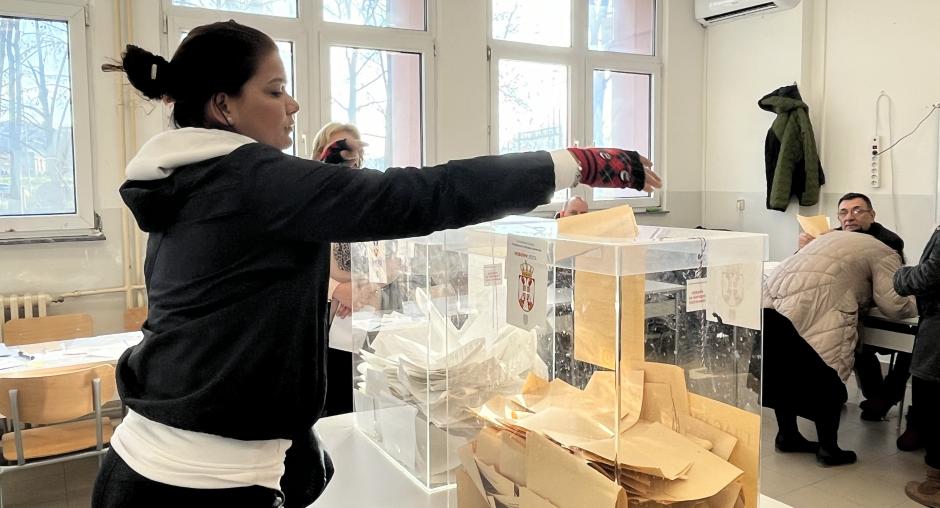Voters had political alternatives in Serbia’s elections but they were marred by overwhelming ruling party advantage, international observers say

BELGRADE, 18 December 2023 – Although Serbia’s early parliamentary elections offered voters a choice between political alternatives and freedoms of expression and assembly were generally respected, pressure on voters as well as the decisive involvement of the President and the ruling party’s systemic advantages undermined the election process overall, international observers said in a statement today.
The joint observation mission from the OSCE Office for Democratic Institutions and Human Rights (ODIHR), the OSCE Parliamentary Assembly (OSCE PA), the Parliamentary Assembly of the Council of Europe (PACE), and the European Parliament (EP) found that the legal framework is adequate to carry out democratic elections. However, there are still numerous issues to address, and in these elections, observers noted the misuse of public resources, the lack of separation between the official functions and campaign activities, and intimidation and pressure on voters, including cases of vote buying.
“While the elections were technically well-organized, they unfolded in the midst of a socially and politically divided landscape,” said Reinhold Lopatka, Special Co-ordinator and leader of the short-term OSCE observer mission. “The decisive involvement of the President dominated the electoral process, and the use of his name by one of the candidate lists, together with bias in the media, contributed to an uneven playing field.”
Yesterday’s elections took place against the background of high polarization and intense competition between opposing political agendas. In the run-up to the election, a number of concerns were voiced about the intimidation and harassment of civil activists, human rights defenders, and journalists.
“Serbian voters have once again been called to the polls, regretfully reinforcing the ‘culture of early elections’, the unlevel playing field these create, and the political instrumentalization of electoral cycles,” said Stefan Schennach, Head of the PACE delegation. “This further undermines public trust in democratic institutions and electoral processes. Terminating parliamentary mandates ahead of time also prevents parliaments from working properly, preparing thorough and inclusive legislation and holding the executive to account, which is key in a parliamentary democracy.”
Some 6.5 million voters were registered to take part in yesterday’s early elections. The election administration prepared for voting day efficiently and transparently, considering the challenges posed by the short timeline and the local and regional elections taking place the same day. However, the frequent number of early elections in recent years have undermined trust in the country’s democratic institutions. Election day was smooth overall, but there were a number of procedural deficiencies, including frequent cases of overcrowding, violations of the secrecy of the vote, and numerous instances of group voting.
OSCE PA Head of Delegation, Farah Karimi, noted: “Serbia has conducted its third parliamentary election in just under four years, a frequency that has diminished the public’s trust in the democratic process and the institutions governing it, and the election campaign has been marked by extreme divisiveness.” Concerns were raised pertaining to free speech, and the treatment of activists, LGBTI individuals, human rights defenders, and journalists, who have faced intimidation and harassment.
The domination of the President in the campaign, despite the fact that he was not a candidate in yesterday’s elections, gave his party an unjustified advantage. In addition, a number of earlier recommendations to improve oversight mechanisms and introduce a campaign expenditure limit remain unaddressed, which reduces transparency and increases opportunities for high campaign spending, potentially further undermining the chances of the opposition.
“The electoral campaign took place against the background of Russia’s ongoing war of aggression in Ukraine. The information manipulation remains a concern in Serbia even though it was not the predominant topic of the elections,” said Klemen Grošelj, Head of delegation from the European Parliament. “The low level of political debate, the pressure on the voters, the emphasis on personally discrediting opponents, the harsh rhetoric used during the campaign and, in general, the political life of Serbia, are all very worrying elements.”
While Serbia has a large number of media outlets and the media covered all candidates in line with the law, the diversity of views was greatly reduced by the high degree of polarization and strong influence of the government on most of them. At the same time, media reporting was dominated by the ruling parties and positive coverage of the President. The oversight body responsible for electronic media was not effective in stopping violations during the election period. Observers also noted numerous reports about critical journalists who were verbally insulted by state officials, as well as co-ordinated attacks on journalists by pro-government media.
“While the Serbian authorities organized the elections efficiently on a tight schedule, the opposition’s lack of access to the media and absence of genuine analytical reporting impacted voters’ ability to make an informed choice,” said Ambassador Albert Jónsson, who headed ODIHR’s election observation mission. “Measures are also lacking to prevent misuse of public office and resources, and, in practice, the line between official duties and campaign activities was blurred.”
The international election observation mission to the early parliamentary elections in Serbia totalled 361 observers from 45 countries, made up of 254 ODIHR-deployed experts, and long-term and short-term observers, which comprised 71 from the OSCE PA, 23 from PACE, and 13 from the EP.
For more information, please contact:
Katya Andrusz, ODIHR: +48 609 522 266 or katya.andrusz@odihr.pl
Nat Parry, OSCE PA: +45 601 08 177 or nat@oscepa.dk
Sylvie Affholder, PACE: +33 7 60 19 75 05 or sylvie.affholder@coe.int
Raffaele Luise, EP: +32 477 85 52 67 or raffaele.luise@europarl.europa.eu
